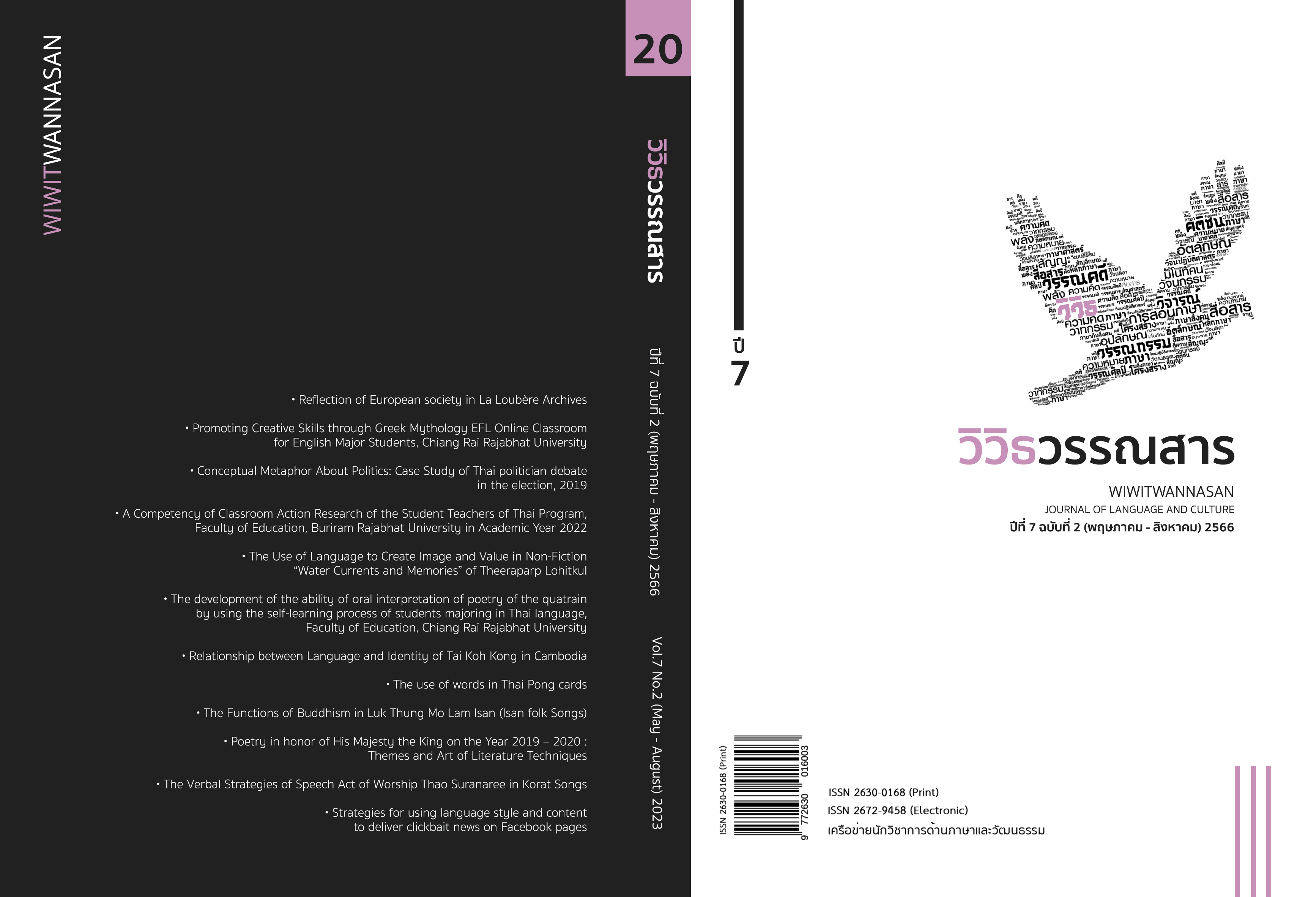Promoting Creative Skills Through Greek Mythology EFL Online Classroom for Undergraduate Students
Main Article Content
Abstract
This study aimed to examine the creative abilities through Greek mythology EFL online Classroom and investigate the students’ attitude toward the Greek mythology EFL online classroom of English major students, at Chiang Rai Rajabhat University. Participants were 144 second-year students who enrolled in Mythological Background in Literature course during the semester 2nd of academic year 2021.The classroom was instructed through Microsoft Team online classroom arrangement. A mix-methods approach with purposive sampling was used in this study. The instruments were the course syllabus implementing activities that encourage students to develop their creative abilities, online questionnaire, and observation. Data were analyzed by using descriptive analysis with percentage, mean, standard deviation (S.D). The finding showed that participants enjoyed activities such as monster drawing (80.80%), photography (74.3%) and creating story-telling video clip (71.90%) respectively. They agreed that these activities help them expand their creative and innovative thinking skill, with the highest-level mean score of 4.52 (S.D.=0.8), followed by analytical and critical thinking skills at 4.23 (S.D.= 0.69), collaboration and team work at 4.21 (S.D. = 0.71), and language at 4.14 (S.D.=0.85)
Regarding the attitude, data revealed that participants were found to hold a positive attitude toward the Greek mythology EFL online classroom. They were very agreed at the highest score at 4.85 (S.D.= 0.75) that they prepared and did some self-research before study. However, limitations were observed that they have struggled with English speaking anxiety, and still performed as a passive learner as a result of a lack of confident, language competency, and inadequate literary background knowledge.
Article Details

This work is licensed under a Creative Commons Attribution-NonCommercial-NoDerivatives 4.0 International License.
Copyright is that of the journal any reproduction must be permitted by the editor of journal
References
Albert, A., Kormos, J. (2011). Creativity and narrative task performance. Language Learning. 61(1), 73-99.
Agypong, Aaron A. (2019). Photography and Creativity. Creative Studies Graduate Student Master’s Projects. 295. http://digitalcommons.baffalostate.edu/creativeprojects/295
Ahmed, S. (2015). Attitudes towards English Language Learning among EFL Learners at UMSKAL. Journal of Education and Practice. 6(18), 6-16.
Anurit, T. (2016). Implementation of literature circles to enhance Thai EFL learners’ critical thinking skills. Pasaa Paritat Journal, 31 (81-106).
Bae, B. Y. (2018). In Pursuit of Transformative Learning: Exploring the Stimulation of Curiosity Through Critical Reflection in the College Classroom.
Baber, H. (2020). Determinants of Students’ Perceived Learning Outcomes and Satisfaction in Online Learning during the Pandemic of COVID19. Journal of Education and e-Learning Research. 7(3), 285-292.
Byeong Cheon, L. (2013). Suggestion for Language learner: Creativity Development in EFL Classroom. ACADEMIA. 87-109.
Meihami, H. (2022). An exploratory investigating into EFL teacher educators’ approaches to develop EFL teacher’ ability to teach for creativity, Thinking Skills and Creativity, 43. 101006. http://doi.org/10.1016/j.tsc.2022.101006.
Corazza, G.E. (2016). Potential originality and effectiveness: The dynamic definition of creativity. Creativity Research Journal, 28(3), 258-267.
Guiford, J.P. (1956). Three faces of intellect. American psychologist, 14(8), 469.
Kaowiwattanakul, S. (2019). Fostering EFL Students’ global mindedness at the undergraduate level through the use of literature teaching activity based on a Reader-Response theory. Pasaa Paritat Journal, 31(136-153).
Kassem, H. M. (2020). Attitudes towards English Literature: The Case of EFL Students at Three Saudi Colleges. Studies in English Language Teaching. 8(3), http://dx.doi.org/10.22158/selt.v8n3p1
Van Hooijdonk, M., Mainhard, M., Kronesbergen, E. H., Van, J. (2022). Examining the assessment of creativity with generalizability theory: An analysis of creative problem solving assessment tasks. Thinking Skill and Creativity 43. https://doi.org/10.1016/j.tsc.2021.100994
Hrešć, T. (2016). Ways of promoting creativity in EFL classroom. Diploma Thesis. Filozofski fakultet u Zagrebu, Department of English Language and Literature. [mentor Geld, Renata].
Melver, P.,& Young, P. S. (2020). Using Classical Literature in EFL/ESL Classroom to Improve Student Motivation and Achieve Linguistic Proficiency. The Journal of Asia TEFL. 17(4). 1439-1447.
Rahimi, A., Hematiyan, N. (2012). Do you have a creative class? A yard stick to assess creativity level of EFL classroom. Procedia Social and Behavior Science. 46. 5919-5923.
Yalçin, S. (2018). 21st Century Skills and Tools and Approaches That Are Uses to Measure These Skills. Ankara University Journal of Faculty of Educational Sciences, 51 (1), 183-201.
Zuu, Y., Ritter, S., Dijksterhuis, A. (2020). Creativity: Intrapersonal and interpersonal selection of creative ideas. The Journal of Creative Behavior, 54(3), 626-635.


